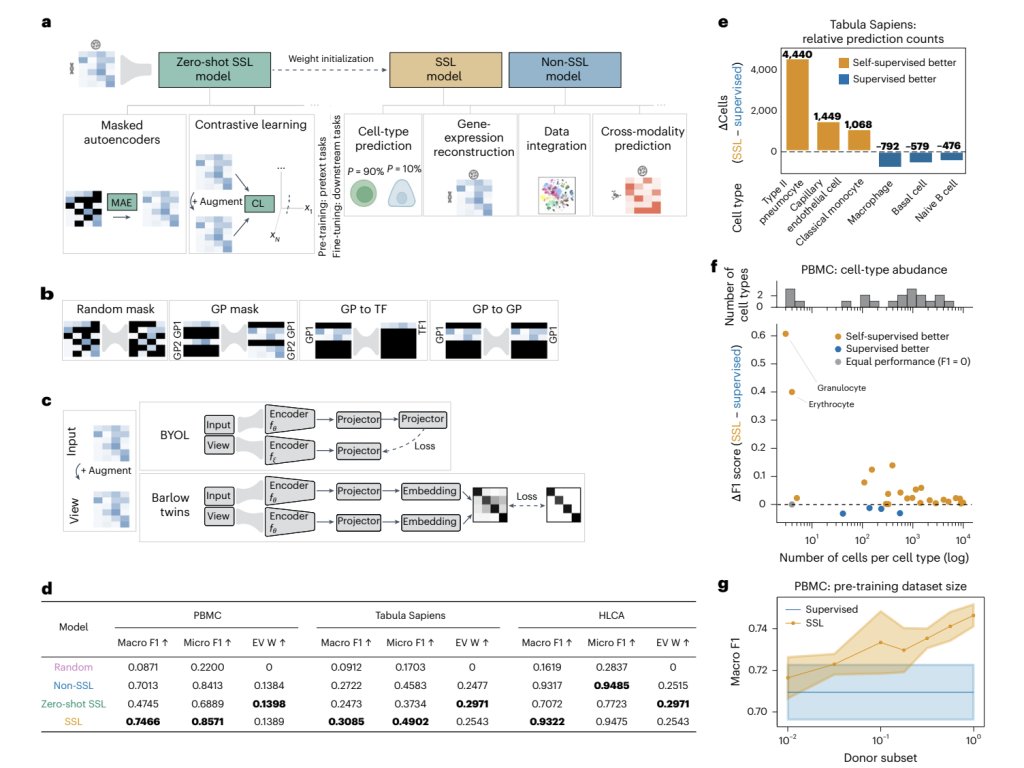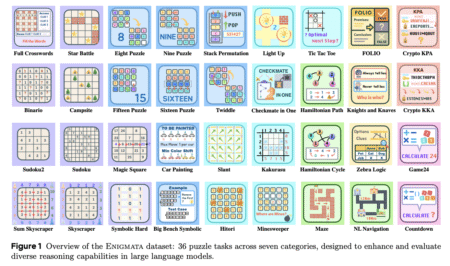

SSL is a powerful technique for extracting meaningful patterns from large, unlabelled datasets, proving transformative in fields like computer vision and NLP. In single-cell genomics (SCG), SSL offers significant potential for analyzing complex biological data, especially with the advent of foundation models. SCG, fueled by advances in single-cell RNA sequencing, has evolved into a data-intensive domain, shifting from isolated studies to machine learning-based interpretation within broader datasets. Despite this progress, challenges like batch effects, variable labeling quality, and the sheer scale of data persist. SSL distinguishes itself from supervised learning by leveraging pairwise data relationships and from unsupervised learning by not solely relying on unlabelled data, making it a promising approach to address SCG’s complexities.
SSL has shown versatility in SCG, from small-scale applications such as contrastive learning for embedding cells and identifying cell subpopulations to large-scale foundation models trained on massive datasets. These models often use transformers and self-supervised pretraining, demonstrating substantial improvements. However, disentangling the benefits of SSL from those of transformer architectures and scaling laws remains an open question. Furthermore, while SSL has been applied effectively to address challenges like batch effects and data sparsity, its generalizability across downstream tasks is limited due to its focus on specific problems or small datasets. Exploring non-transformer-based SSL methods and comparing them to alternative approaches like semi-supervised learning is crucial for maximizing its impact in SCG and addressing the broader challenges of big data in the field.
Researchers from Helmholtz Munich and the Technical University of Munich benchmarked SSL methods in SCG, focusing on tasks such as cell-type prediction, gene-expression reconstruction, cross-modality prediction, and data integration. Using the CELLxGENE dataset of over 20 million cells, they evaluated SSL methods like masked autoencoders and contrastive learning. Their findings highlight SSL’s strengths in transfer learning scenarios, particularly when analyzing smaller or unseen datasets. While SSL improves performance in diverse tasks and class-imbalance-sensitive metrics, pre-training on the same dataset offers no significant advantage over supervised or unsupervised training. This study emphasizes SSL’s role in advancing SCG.
The study focuses on SSL methods for SCG data. It involves a structured pre-processing pipeline, normalizing datasets, and using specific single-cell atlases like scTab, which consists of 22.2 million cells from diverse human donors and tissues. The approach includes two primary phases: pre-training using contrastive learning or denoising to acquire broad data representations and fine-tuning to enhance task-specific performance. SSL leverages unlabelled data by learning meaningful relationships between samples. Additionally, the study applies SSL methods in downstream tasks like cell-type annotation, gene-expression reconstruction, cross-modality prediction, and data integration, comparing these methods against supervised learning approaches.
The study demonstrates the effectiveness of an SSL framework in improving performance for SCG tasks like cell-type prediction and gene-expression reconstruction. SSL enhances generalization by pre-training models on large datasets (e.g., scTab) using techniques like masked autoencoders and contrastive learning, especially for underrepresented cell types. The framework outperforms traditional supervised learning, particularly in zero-shot settings. Tailored masking strategies improve performance, with SSL showing robustness across diverse datasets, even in imbalanced scenarios. SSL offers significant advantages for SCG by reducing reliance on labeled data and enhancing model accuracy.
In conclusion, the study explores the application of SSL in SCG, highlighting its potential for improving performance in tasks like cell-type prediction and gene-expression reconstruction. The research demonstrates that SSL excels in transfer learning, particularly when leveraging auxiliary data or handling unseen datasets. Masked autoencoders, with random masking strategies, are found to be the most versatile and robust approach for various tasks. The study suggests SSL’s advantages are especially notable in scenarios involving distributional shifts or small datasets, offering a practical framework for researchers to apply SSL effectively in SCG.
Check out the Paper. All credit for this research goes to the researchers of this project. Also, don’t forget to follow us on Twitter and join our Telegram Channel and LinkedIn Group. Don’t Forget to join our 70k+ ML SubReddit.
The post Advancing Single-Cell Genomics with Self-Supervised Learning: Techniques, Applications, and Insights appeared first on MarkTechPost.
Source: Read MoreÂ





